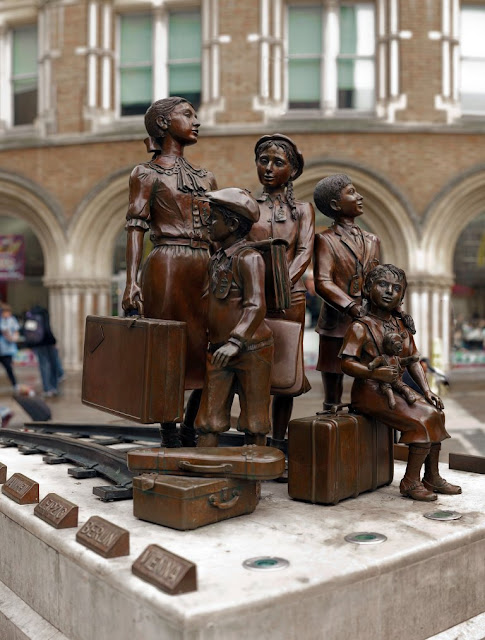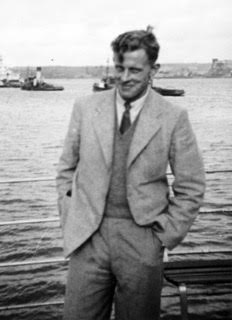WW2 75.1: The Experience of a World War Two Refugee in Budleigh
Sculptor Frank Meisler's ‘Kindertransport – The Arrival’ (2006) stands outside London’s Liverpool Street station.
A project established by the Association of Jewish Refugees, it pays tribute to those Britons who aided the rescue of 10,000 Jewish children from the Nazi persecution which led on to the Holocaust. Image credit: Wjh31
I’m not certain of being
around for the centenary of the outbreak of World War Two. So 2020, the 75th
anniversary of the war's end, seems a good time to reflect on those terrible five
years that my parents’ generation endured.
Especially as it may help to
put the relatively minor disaster of Covid-19 into perspective.
Sadly, the grim pandemic has
meant that Fairlynch Museum’s VE Day display may not be seen by as many
visitors as it deserves. Here’s a testimony from the Museum’s archives which
relates to the early years of WW2 rather than to 1945.
It’s an account written by
an R. Muller about his experience as an evacuee, following his escape from Nazi
Germany and its persecution of Jewish people.
The Beaufoy Institute, Black Prince Road, Lambeth. The Listed
Grade II building, built by the Beaufoy family, is now a Buddhist Centre
The young German boy had
been enrolled as a pupil in the Beaufoy Institute, set up by the vinegar
manufacturer Mark Hanbury Beaufoy to replace a ‘ragged school’ serving deprived
children in the London Borough of Lambeth.
Threatened by enemy air raids, the Beaufoy Institute was
evacuated to Devon. One of its pupils described his experiences, as published
in the 1940 edition of the school
magazine Beech Leaves:
‘It is just over a year ago that I came to England
with about four hundred other boys and girls who were being sent here by a
Jewish-British Committee to escape the persecution of the Jews which was going
on in Germany.
It was a foggy and rainy morning when we arrived at
Harwich after a rough channel crossing. I was still suffering from the after
effects of seasickness and so felt very miserable and homesick in a strange
country. After I had been in England a little while it did not seem so strange
as I began to understand people when they spoke to me in English. In due course
I was sent to Beaufoy Technical Institute where I found myself in entirely
different surroundings. I tried to be friendly with my companions but being a
foreigner this was a little difficult, whilst being a German made it more
difficult still. I found the boys were interested in hearing about the state of
affairs in Germany, especially about the Gestapo and the Spy-service.
In September, owing to the outbreak of war, it was
decided to evacuate the school children from the London area in case of
air-raids. Our school was lucky enough to be sent to Budleigh Salterton. By the
time we got to Devon my English had improved and with great pleasure I noticed
that many of the boys had forgotten that I was not one of them. Only sometimes
after some little quarrel they may call me ‘little Hun’ or ‘Nazty spy’ – this,
however, I know is meant only as a joke and I soon forget it. I am really
grateful to the staff and the boys of our school, all of whom have given me so
much help and made me feel like a countryman of their great country which has
done so much for me.’ R. Muller
It would be wonderful to
track down R. Muller or his family and welcome them to the town of which he had
happy memories
The next piece in my WW2 75 series is at
https://budleighpastandpresent.blogspot.com/2020/07/ww2-75-yes-budleigh-was-bombed.html
The next piece in my WW2 75 series is at
https://budleighpastandpresent.blogspot.com/2020/07/ww2-75-yes-budleigh-was-bombed.html
You can access other posts on this blog by going to the Blog Archive (under the ‘About Me’ section), and clicking on the appropriate heading.






Comments
Post a Comment